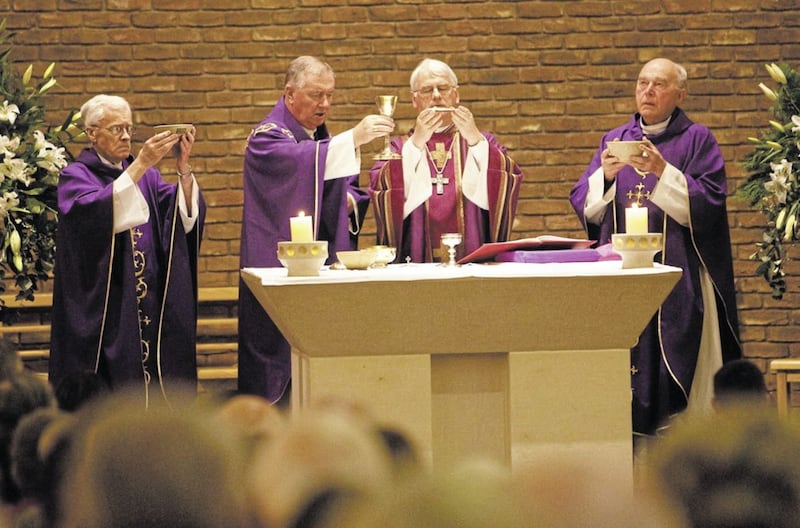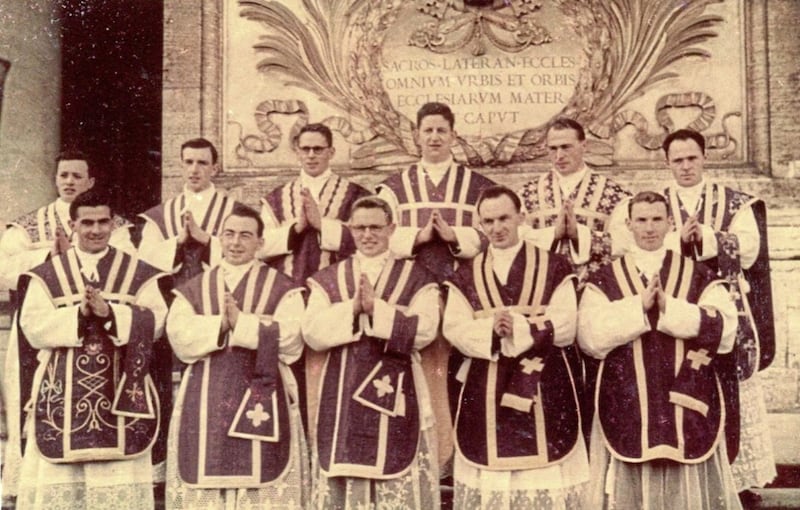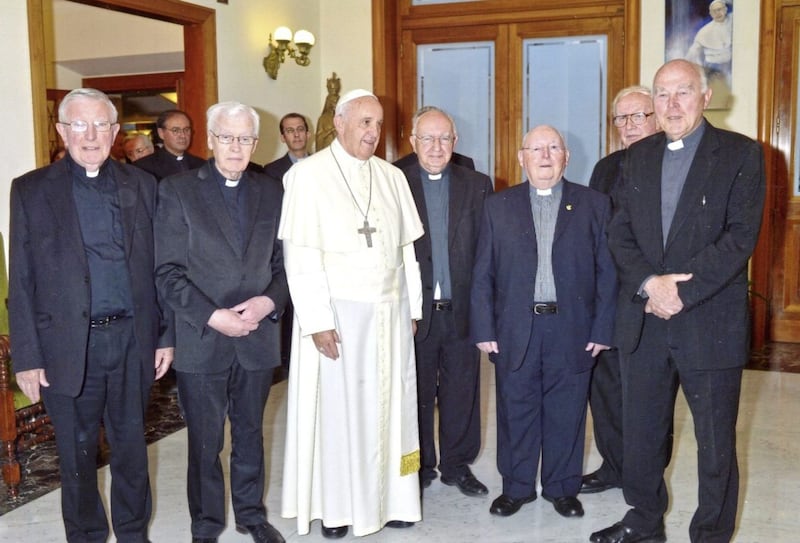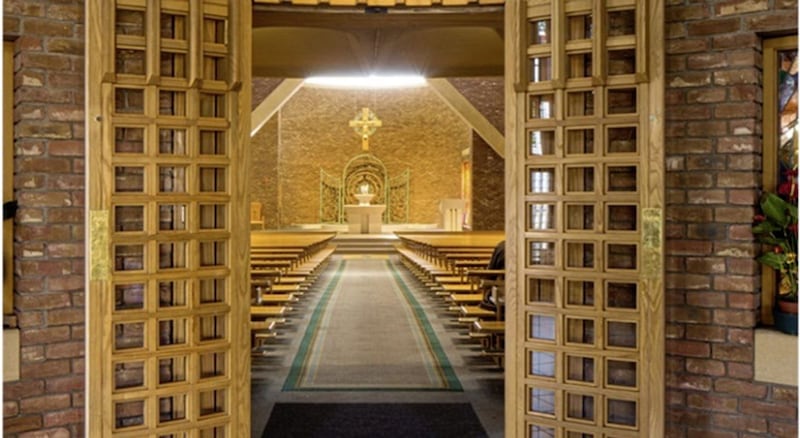WHEN the parishioners of St Brigid’s in south Belfast gathered for a special Mass and reception on January 24 to mark the silver jubilee of the opening of their beautiful church, they did so with mixed feelings.
There was joy in celebrating a milestone in our parish’s history but also sadness that Monsignor Ambrose Macaulay, our parish priest for more than 20 years, who had commissioned the building of the new St Brigid’s, was not with us.
Few sensed that he was far away - his mortal remains lay, at his request, in a special burial plot metres from the church entrance.
Fr Macaulay (as I always called him), a devoted priest and one of the foremost ecclesiastical historians in these islands, died suddenly in his sleep at his Maryville Park home, just over a mile from St Brigid’s, on November 5. He was aged 85.
His death evoked genuine sorrow because he was a much loved pastor; deep shock because it was so unexpected; and a sense of profound disappointment because it meant that he would be absent from the celebration of the 25th anniversary of the building of the church, that is widely recognised as an architectural gem.
The celebration had been scheduled for November 15 and was postponed until January owing to his death.
Less than a week earlier Fr Macaulay told me that he had been greatly looking forward to it.
His sudden death struck me personally because he was a friend, guide and confidant for more than 40 years and I - and numerous others - are missing him deeply.
Ambrose Macaulay, one of a family of 10, was born in Cushendall, Co Antrim in October 1934.
He attended St Malachy’s College, graduated in history at Queen’s University in 1956, and studied at the Irish College in Rome before his ordination as a priest, alongside his lifelong friend, Canon Brian McCluskey, in the Basilica of St John Lateran in 1960.

He recalled, as a clerical student, a visit by Pope St John XXIII to the Irish College when he addressed the seminarians.
A noted scholar, Dr Macaulay secured a Doctorate in Ecclesiastical History from the Pontifical Gregorian University in 1963, the doctorate centring on research into William Crolly, an Archbishop of Armagh, that he subsequently developed into a magisterial biography.


Although a hard-working priest in Belfast for almost 50 years until his retirement from St Brigid’s in 2010, Fr Macaulay somehow marshalled the discipline to convert his passion for history, especially Church history, into six full-length books – both biographies and histories, published between 1983 and 2016 - spanning the tumultuous period from the mid-eighteenth century to the end of the nineteenth, embracing the 1798 Rising, the Act of Union, Emancipation, the Famine and the Land War.
He was a shy, reserved man noted for his wonderful utterly selfless ministry to the dying and their families.
A shrewd and efficient administrator, he made the difficult tasks look easy.
He displayed a remarkable talent for keeping his finger on the pulse of the parish, retaining a tremendous capacity to remember names and connections.
He gave only one extended media interview in his life, to me in The Irish Catholic in 2016 - available at www.irishcatholic.ie - when I persuaded him of an opportunity to publicise his last and acclaimed book The Catholic Church and the Campaign for Emancipation in Ireland and England (Four Courts Press).
A man of simple taste, Fr Macaulay declined to wear the apparel of a monsignor except at formal occasions such as an episcopal ordination.
Despite his credentials as a historian, it is obvious that his primary vocation was the priesthood and he continued to assist with Masses in the parish of Bangor right up until his death and on Wednesdays celebrated Mass for the Dominican Sisters on the Falls Road.
Fr Macaulay was appointed assistant chaplain at Queen’s University in 1964 and succeeded his close friend, the future Bishop Patrick Walsh, as chaplain in 1970, a position he held until 1985 when he was appointed parish priest of St Anthony’s, Willowfield, a faith community ravished by the Troubles where be brought hope and inspiration, leading the celebration of its golden jubilee in 1988.
In 1989 he arrived in St Brigid’s where his permanent memorial will be the two remarkable initiatives he led with great skill and resolve - the building of its beautiful church and state of the art parish centre.

On the day before his death he was guest of Bishop Walsh for lunch at his home, accompanied by Fr Joe Gunn, parish priest of Bangor, who succeeded him as chaplain at Queen’s.
His tenure as chaplain saw the horrors of the Troubles, a particularly low point being the sectarian murder of student and QUB Gaelic footballer Michael Mallon.
For decades his chaplaincy in Elmwood Avenue was protected by hoardings.
However, amid the daily horrors unfolding on our streets, Fr Macaulay by his words and actions proclaimed the “joyful hope” that Fr Gunn said in his funeral homily encapsulated the priest, relative and friend that he was.
Sporting passion, in particular his devotion to Queen’s University Gaelic Football Club, blended easily into pastoral care.
For more than 40 years he was president of Queen’s GFC and on the evening of the removal of his remains I was privileged to be among the members of the Queen’s GFC Past Members’ Union - led by Sean O’Neill, the Down GAA legend and close friend of Ambrose - who carried his coffin from his home a little of the way to St Brigid’s where Fr Edward O’Donnell, his successor as parish priest, recalled his devotion to St John Henry Newman.
In his homily Fr Gunn said: “Discretion is a vital quality for a priest and gentleness a virtue. Family, friends and parishioners quickly learned that relating private matters to him was like confiding them to the tomb, often accompanied by a sympathetic ‘Ay’.”
An historian once wrote of a great churchman that he displayed “devoted pastoral service, academic ability and administrative talent” as well as “personal integrity and uncompromising sincerity”.
That historian was Dr Macaulay himself in his biography of William Crolly.
Those words also apply aptly to their author.
May his gentle soul rest in peace.
Martin O’Brien
![Monsignor Ambrose Macaulay [right] with Bishop Patrick Walsh [left] and Cardinal Cahal Daly at the launch of his book The Holy See, British Policy and the Plan of Campaign in Ireland, 1885-93. Picture by Brendan Murphy](https://www.irishnews.com/resizer/v2/JDQSGVEDYZIVHJZQOUE75JWZZA.jpg?auth=bbe081192738af8080067b525c9b5bf53ad6a8ff37c60b497e41ed9a30ec257c&width=800&height=512)
![Monsignor Ambrose Macaulay [right] with Bishop Patrick Walsh [left] and Cardinal Cahal Daly at the launch of his book The Holy See, British Policy and the Plan of Campaign in Ireland, 1885-93. Picture by Brendan Murphy](https://www.irishnews.com/resizer/v2/ZQBGYQ7OQZM3BCTSEOAJUNVJKY.jpg?smart=true&auth=7f7d18fc83af01c82fbecb67512539950bfb9c004e287aab186d52c5f87864f2&width=800&height=450)


